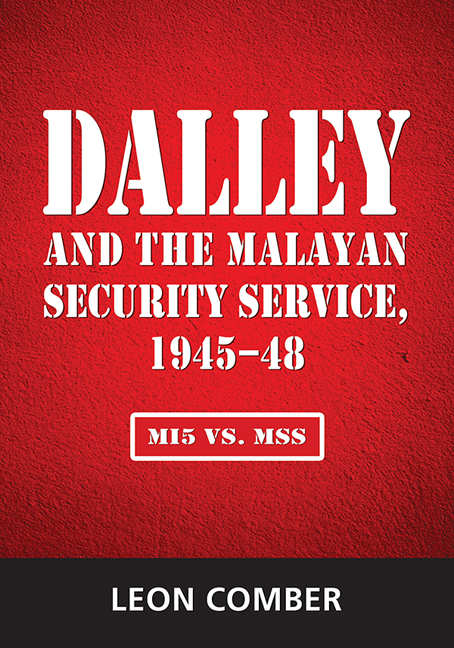Book contents
- Frontmatter
- Contents
- Preface
- Acknowledgements
- List of Abbreviations
- 1 Lieutenant Colonel John Dalley and the MSS: Early Days
- 2 Lieutenant Colonel John Dalley and Dalforce
- 3 The Establishment of “Security Intelligence Far East (SIFE)” in Singapore
- 4 Dalley's Return to Singapore
- 5 The Indonesian Situation and Malaya
- 6 Indonesian Encroachment into Malaya
- 7 Arrangements for Allocation of MSS Staff to Special Branch, Singapore, and Special Branch, Malaya
- 8 Conclusion
- Appendices
- Bibliography
- Index
- About the Author
3 - The Establishment of “Security Intelligence Far East (SIFE)” in Singapore
Published online by Cambridge University Press: 12 February 2019
- Frontmatter
- Contents
- Preface
- Acknowledgements
- List of Abbreviations
- 1 Lieutenant Colonel John Dalley and the MSS: Early Days
- 2 Lieutenant Colonel John Dalley and Dalforce
- 3 The Establishment of “Security Intelligence Far East (SIFE)” in Singapore
- 4 Dalley's Return to Singapore
- 5 The Indonesian Situation and Malaya
- 6 Indonesian Encroachment into Malaya
- 7 Arrangements for Allocation of MSS Staff to Special Branch, Singapore, and Special Branch, Malaya
- 8 Conclusion
- Appendices
- Bibliography
- Index
- About the Author
Summary
Before Dalley returned to Singapore from the UK in February 1947, considerable consternation was caused in Singapore by the receipt of a rather extraordinary telegram dated 2 September 1946 from the Colonial Office addressed to Malcolm MacDonald, then Governor-General for Southeast Asia, with copies to the local Singapore and Kuala Lumpur Governors. Seemingly without any further introduction, it forwarded a proposal by Sir Percy Sillitoe, Head of MI5, the UK domestic intelligence organization, whose remit extended to British colonies, to establish a branch to be known as “Security Intelligence Far East (SIFE)” in Singapore.
Colonial Office Telegram to Malcolm MacDonald
It arrived literally out of the blue, as there had not been any prior notice of Sillitoe's proposal and, indeed, there is nothing in the records to indicate that the matter had been under consideration, although clearly it must have been discussed in the Colonial Office. It included an attachment dated 6 August 1946, some weeks before the date of the actual telegram, which was headed “Memorandum of Instruction”, covering the appointment of Lieutenant Colonel C.E. Dixon as Head of SIFE, as well as a “Charter” for SIFE indicating its proposed functions.
As the telegram explained:
The documents were, of course, first submitted in draft for approval here [presumably by MI5 to the Colonial Office], but as the Security Service [MI5] were most anxious to secure general approval with their provisions without delay, and in view of the fact that the relations of SIFE with Colonial Governments will generally be through Defence Security Officers whose duties are defined in a standard form of their own Memorandum of Instructions, it was in the circumstances agreed that general approval could be given without submitting the drafts to the Governors for comment.
This certainly seemed to be, to say the least, a rather unusual method on the part of the Colonial Office to issue “instructions” to Singapore/Malaya, especially as Dalley had been available for consultation in the UK and the MSS in Singapore would be affected. As could be expected, the telegram caused some consternation in Singapore and the matter was considered at some length at several high-level meetings.
- Type
- Chapter
- Information
- Dalley and the Malayan Security Service, 1945–48 , pp. 35 - 44Publisher: ISEAS–Yusof Ishak InstitutePrint publication year: 2018



